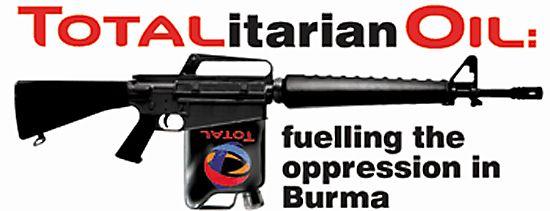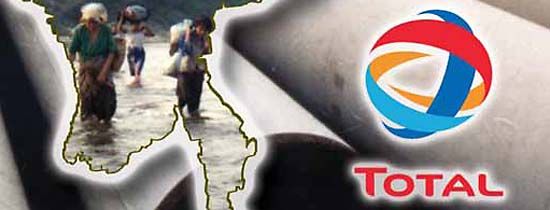Total was considered by the Fund Council on Ethics in 2005 for complicity in human rights abuses in Burma. The Council issued a recommendation not to expel Total out of the Pension Fund – decision now sharply criticized by Earth Rights International (ERI). According to the organization, Total deliberately spread misleading information about conditions in Burma to investors and public.
 Total denies the allegations.
Total denies the allegations.
The Norwegian Burma Committee believes the criticism against the Council on Ethics is justified. “Total’s status in the Petroleum Fund must be reconsidered”, – stated Inger Lise Husøy in an article cited by Morgenbladet. – Forced labour, arbitrary killings, rape and other abuses are still widespread in areas where Total operates.Total case shows that the Ethics Council must have a very critical approach to information from companies being examined. The only right of the Ethics Council now is to make up for the old injury and go through the Total case again,” – she added.
According to the Norwegian Burma Committee, the Pension Fund must push Total to change the practice or withdraw from the Pension Fund. Otherwise the Norwegian governmental body remains engaged in  human rights violations and military junta’s corruption network.
human rights violations and military junta’s corruption network.
– Norway is helping gross corruption, – said Husøy to aftenposten.no, referring to Petroleum Fund’s investments in oil companies Total and Chevron. According to the newspaper, both companies extract natural resources from Burma in a way that severely violates the rights of local populations.
‘Naïve NGO’ vs oil giants and military regime
Two new reports from Earth Rights International document (in English) that:
– It is still ongoing systematic violations of human rights in areas around the French oil company Total’s gas pipeline through Burma;
– Total deliberately provided investors and the public with misleading information and blatant lies about the situation of civilians in areas around the gas pipeline.
According to Norwatch, it means that the Ethics Council of the Norwegian Government Pension Fund and several other socially conscious investors have been deceived (story in English).
One of the main sources in the Ethical Council’s grounds for not excluding Total was the American organisation The Collaborative for Development Action (CDA).
CDA concluded that the human rights infringements were more or less absent in the pipeline area where the oil company operated. The company’s presence thus appeared almost to be a guarantee against the military regime’s abuse of the civilian population, which otherwise is well documented.
Now, CDA is criticised for being extremely naïve and for lacking a method for carrying out reliable investigations under such difficult circumstances as in the military dictatorship of Burma.
Villagers warned against confiding
CDA has since 2002 visited Burma and the pipeline villages five times. During each of the Burma visits CDA spent only 2 to 5 days in the area. The rest of the time was spent in the capital, Rangoon.
During all the visits to the pipeline area, CDA’s inspectors were escorted by representatives from the oil company, and they made use of interpreters that Total had furnished.
Thereafter, CDA is supposed to have interviewed the villagers openly, in groups, and Total employees and Burmese intelligence officers were close by and could hear everything that was said.
 The villagers have told EarthRights that Burmese intelligence officers visited the villages in advance of CDA’s visit and ordered them to be careful of what they told the foreigners.
The villagers have told EarthRights that Burmese intelligence officers visited the villages in advance of CDA’s visit and ordered them to be careful of what they told the foreigners.
“We did not say everything we knew clearly to these foreigners because we had been warned by the soldiers in advance,” one of the pipeline’s neighbours stated in the EarthRights report.
Not surprisingly, CDA could consequently conclude that they never heard anything negative about Total’s presence and that abuses of the civilian population did not occur in the pipe trench where Total was present.


